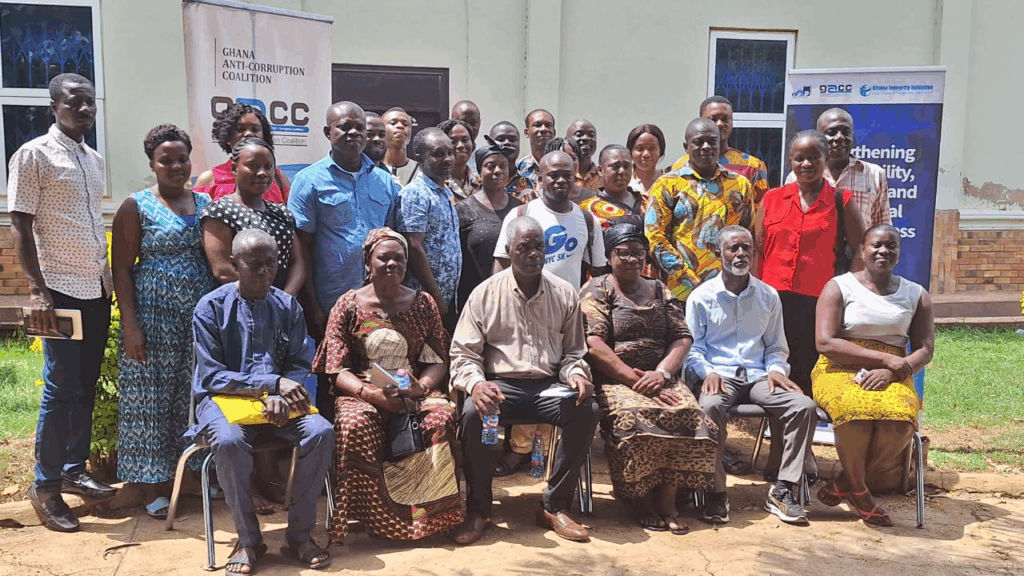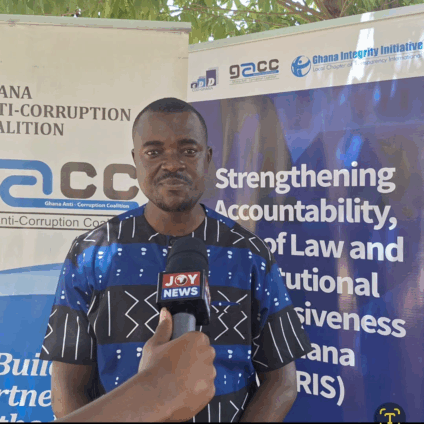
Audio By Carbonatix
Ghana’s battle against corruption has stagnated in recent years, with the country maintaining a score of 43 out of 100 on the international corruption index for three consecutive years — a score widely considered inadequate for a nation striving to become corruption-free.
The financial toll is alarming. Ghana reportedly loses over $3 billion annually to corruption — the same amount it seeks in its current arrangement with the International Monetary Fund (IMF).
In response, the Ghana Anti-Corruption Coalition (GACC) is calling for stronger collaboration between anti-corruption agencies, such as the Office of the Special Prosecutor and CHRAJ, alongside greater citizen participation to curb the growing menace.
Speaking during a regional advocacy workshop in Bechem in the Ahafo Region, GACC Programmes Officer Harrison Cudjoe underscored the importance of enforcement and civic engagement.
“There is more room for improvement in the fight against corruption in the country,” Cudjoe said. “We need an all-hands-on-deck approach to reduce the menace. Government, citizens, and other institutions must play their roles in ending it.”
He stressed that while the government must strengthen laws against embezzlement, misappropriation, and financial loss, ordinary citizens also have a critical role to play by being vigilant, asking questions, and raising alarms on suspected corruption.

Cudjoe also urged President John Mahama to review Section 1.5.12 of the newly launched Code of Conduct for public office holders, which regulates the receipt of gifts.
“The section addresses gifts received by public appointees, but it is silent on gifts given by the same people. This is a loophole that must be addressed,” he said.
The advocacy workshop formed part of GACC’s “Strengthening Accountability, Rule of Law, and Institutional Responsiveness in Ghana” (SARIS) initiative — implemented in partnership with CDD-Ghana, the Ghana Integrity Initiative (GII), and other local collaborators, with funding from the European Union.
The SARIS initiative aims to promote transparency, accountability, and institutional responsiveness through media development, civil society empowerment, and targeted anti-corruption reforms.
The GACC has so far organised similar training programmes in the Bono and Bono East regions, aiming to deepen citizens’ understanding of public financial management, audit processes, and the need for active monitoring and reporting of corruption.
Yaw Gyebi, a participant, expressed his appreciation on behalf of the beneficiaries: “The knowledge and skills we’ve gained will not only benefit us but the entire country. In unity and patriotism, we can win the fight against corruption.”
Latest Stories
-
Unlicensed betting firms face sponsorship ban
1 hour -
Police investigate ‘abhorrent’ racist abuse of players
1 hour -
FIFA wants injured players to stay off for one minute
2 hours -
Pacquiao and Mayweather agree professional rematch
2 hours -
Ghana intensifies U.S. investment drive with strategic California outreach
2 hours -
UK says ‘nothing is off the table’ in response to US tariffs
3 hours -
Netflix boss defends bid for Warner Bros as Paramount deadline looms
3 hours -
One Man, One Woman or Polygamy?
3 hours -
‘The end of Xbox’: fans split as AI exec takes over Microsoft’s top gaming role
3 hours -
Carney heading on trade trip as Canada seeks to reduce reliance on US
3 hours -
Trump threatens countries that ‘play games’ with existing trade deals
4 hours -
A Plus seals three-year partnership with MGL for Gomoa Easter Carnival
4 hours -
Parliament to probe SHS sports violence; sanctions to apply – Ntim Fordjour
5 hours -
Upholding parental choice and respecting the ethos of faith-based schools in Ghana
5 hours -
SHS assault: Produce students in 24 hours or we’ll storm your school – CID boss to SWESBUS Headmaster
5 hours

